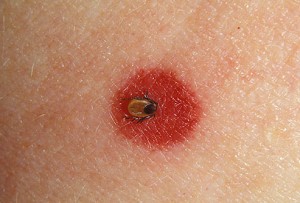Ticks are small insects that affect the host by transmitting bacteria causing fatal diseases like Rocky Mountain Spotted Fever or Lyme disease. The severity of a tick bite ranges from minor, self-treatable conditions to harmful conditions that require immediate medical attention.
A person’s chances of incurring disease depend on where he lives, how often he visits forest-like areas and how well he protects himself when he visits wildlife areas. Ticks are often found in the woods and attach themselves to humans and animals .They travel towards the warmer, damper areas of the body such as areas with a lot of hair, the armpits and the genitals. Once fully attached, ticks begin to suck blood from the host’s body causing many complications to the casualty.

Signs and symptoms
If the following symptoms develop, visit your doctor:
- Redness and itching
- Rashes
- Muscle and joint pain
- Inflammation in the joint areas
- Fever and flu-like symptoms
- Photosensitivity (light sensitivity) to the eyes and skin
Call emergency medical help if any of the following symptoms appear:
- Prolonged, severe headache
- Chest pain
- Heart palpitations
- Breathing difficulties
- Paralysis
Treatment
If you have been bitten by a tick, follow these steps:
- Quickly remove the tick, carefully.
- Grasp the tick’s head or mouth using a pair of tweezers and slowly remove the tick from your skin. Make sure you carry out this procedure gently and carefully as reckless handling may crush the tick.
- Capture the tick in a container. This will be helpful for the doctor when he has to treat signs and symptoms of the bite that may occur in you. Make sure you seal the container and keep it in the freezer. Take the container with you when you visit your doctor.
- Rinse the affected region. Use soap and water to thoroughly wash the area that was bitten by the tick to prevent any itchiness or sores.
- When to call a doctor:
- You are not able to remove the tick properly.
- You incur fatal signs and symptoms such as headaches, chest pain and heart palpitations.
- When minor symptoms are recurrent and prolonged.
Prevention
- When you visit woody, grassy or forest-like areas, make sure you are fully covered and wear boots at all times.
- Pull your socks over your pants to seal the openings of your pants.
- Keep your shirt tucked in.
- Wear light-colored clothes or white clothes so that you are able to detect ticks easily.
- Spray insect-repellents on exposed areas of the skin and clothes.
- Keep checking your clothes for ticks.
- Once you are home, check your clothes for ticks and take them off immediately.
Learn More About Poisons and Environmental Emergencies
To learn more about these and other environmental emergencies enrol into St Mark James training courses with one of providers. We are partnered with the top St Mark James training affiliates which are located throughout the country. We have training facilities in Edmonton, Calgary, Vancouver, Toronto, Ottawa, Halifax and Winnipeg.